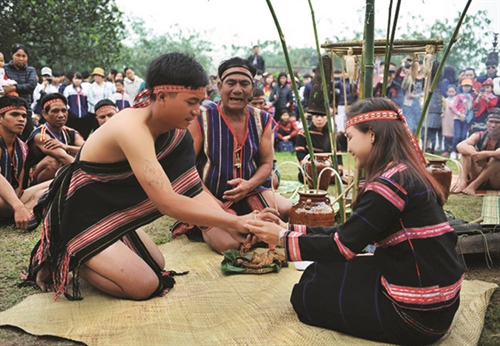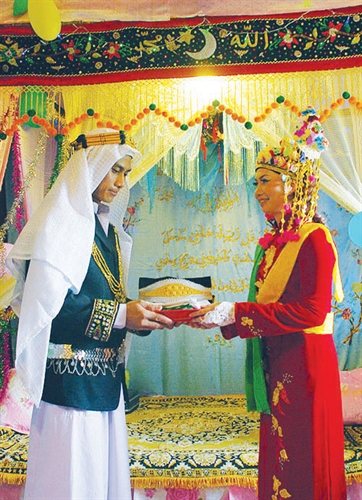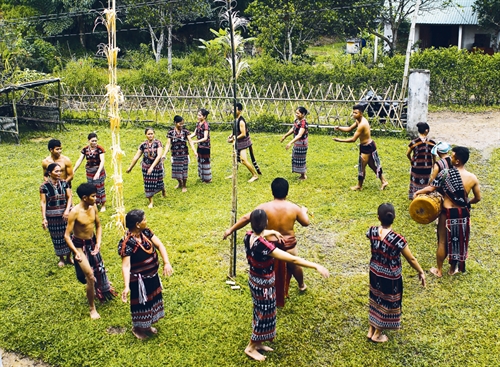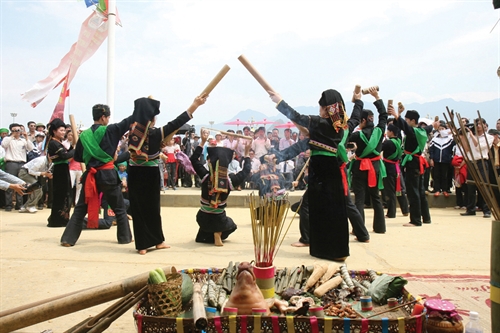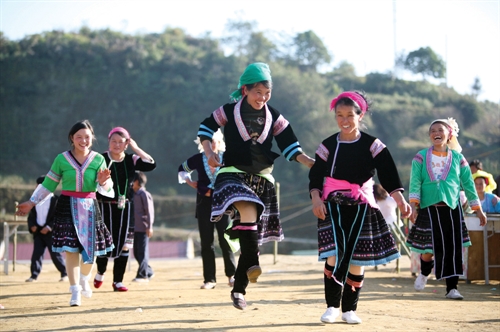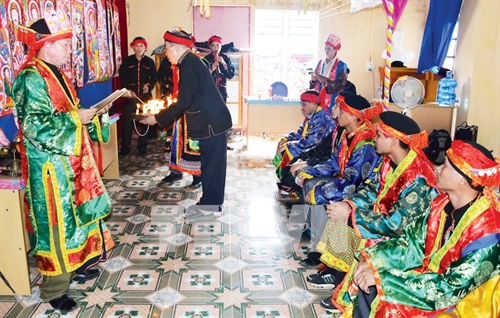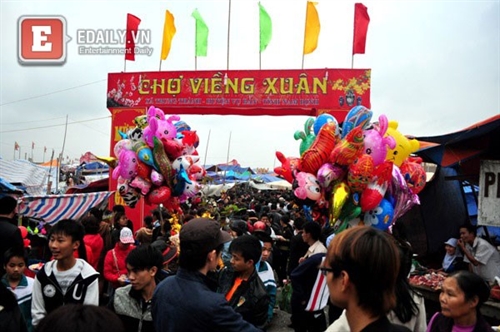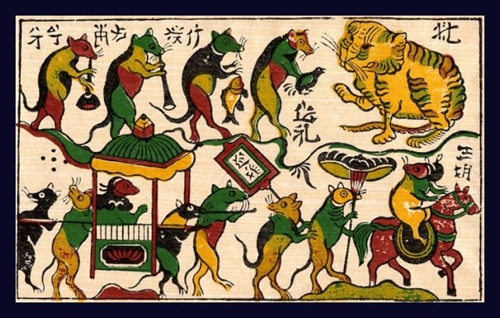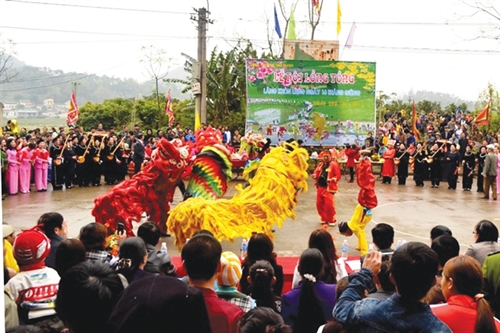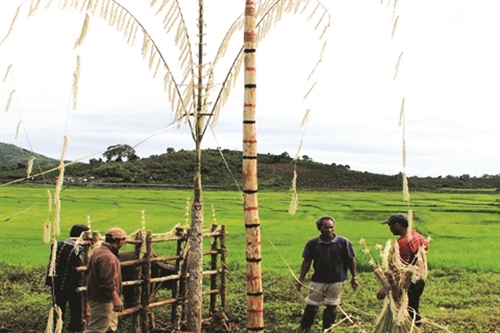Assoc. Prof. Dr. Vuong Toan
Former Senior Researcher of the Vietnam Academy of Social Sciences
Slip sli, a three-day festival held in the seventh lunar month, is the annual second biggest festive event of the Thai, Tay and Nung ethnic groups living in the northern mountainous provinces of Cao Bang, Lang Son, Lai Chau and Dien Bien.
Like the Viet (Kinh) who organize the Buddhist Vu Lan (the Vietnamese transliteration for Ullambana) festival, an event where people express their love and gratitude to ancestors and parents, on the 15th of the seventh lunar month which coincides with the Xa toi vong nhan festival (the day for the lonely spirits) in the Asian custom, the Tay, Nung and Thai prepare their traditional dish with duck meat for offerings to their ancestors on the 14th day of the month. All Tay and Nung families in Cao Bang province make two offering trays - one for their ancestors and one for the spirits. They put on the ancestor altar a tray containing duck meat, pairs of banh gai (called banh deo or peng tai) (sweet sticky rice cakes with distinctive black color filled with green bean or ground roasted peanuts and wrapped in dried banana leaves or pinnate leaves) and daily-use articles made of paper. The other tray containing salt, rice, rice soup, fruits, sweets and children’s paper clothes is placed in the front yard for the spirits, which are believed to be released from hell on that day when the gate of hell is opened for the dead’s souls to return home and reunite with their families.
As Slip sli marks the end of a crop, panh cuoi (sticky rice cake made with grinded banana) and panh cay (sticky rice cakes with green beans, minced roasted chicken and groundnuts) are indispensable dishes of the Thai while the Tay make sticky rice cakes containing minced roasted chicken and groundnuts or molasses and grinded banana on this occasion. In addition to duck meat, the Thai also offers banh it uoi (sticky rice cakes made with meat and green beans) and xoi ngu sac (five-colored sticky rice) to their ancestors and the genie of the land.
In particular, duck meat and banh chung (cylinder sticky rice cakes) are indispensable dishes on the offering trays of the Thai Trang (white Thai), a sub-group of the Thai, to pray their ancestors for peace and prosperity. Thai Trang families also offer chicken, banh ran (deep fried tiny sticky rice balls), com nep nuong (young sticky rice flakes), alcohol, five-colored sticky rice and fruits. According to popular belief, ducks are expected to bring bad luck away. On this occasion, ducks are released into paddy fields to feast on insects and weeds, which helps rice grow. Slip sli is also an occasion for the Thai Trang to invite their relatives and friends to their homes for meals as they believe the more guests come, the more luck the family has.
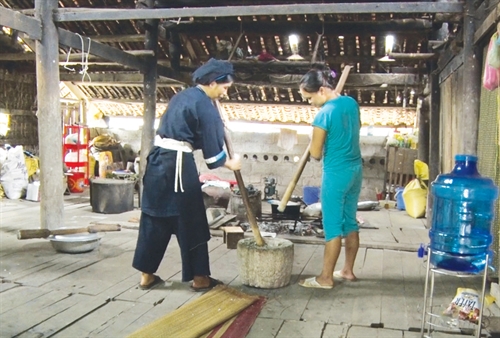 |
| Pounding rice to make “gai” cake in preparation for the seventh lunar month festival__Photo: Quan Trang/VNA |
The 14th or 15th day of the seventh lunar month is also an occasion for the Tay, Nung and Thai couples and their children to pay visits to their maternal parents, which are called pay tai. This is the second time in the year - the first one on the second day of the first lunar month married Tay, Nung and Thai women return to their parents’ home to make offerings to their ancestors. According to the Tay and Nung’s custom, future sons-in-law must bring offerings to put on their future wives’ ancestor altars not only on the traditional lunar new year festival but also on the 15th day of the seventh lunar month after the bride families receive their engagement gifts. For the Thai Trang, the 14th day is an occasion for them to present a pair of ducks and sticky rice to their maternal parents to make banh chung.
In old days, the Thai used to hold offering rites dedicated to buffaloes’ souls and paddy fields. On the morning of the 14th day, all families in a hamlet joined in killing a pig as the offering to pray buffaloes’ souls. During the offering ceremony, the shaman gave salt to the buffaloes to help them remember the way to return home and poured alcohol on their head for luck and protection against forest beasts. After the ceremony, the buffaloes were released into the forests to enjoy green grass after a hard-working season. In the afternoon, every family organized an offering rite at the mouth of the gully where water was taken for their paddy fields to pray for bumper crops. They used to offer duck meat, sticky rice, alcohol, and paper fish, crabs and insects.
The Nung Phan Slinh, a sub-group of the Nung, in Cao Loc district of Lang Son province, celebrates Slip sli for three days. On the afternoon of the 13th day, Nung Phan Slinh fathers and uncles roast a pig filled with mac mat (clausena indica) leaves and spread with honey while mothers and girls are busy making peng tai and bun (fresh rice vermicelli). The next day, the roasted pig is equally divided among the participating families. The offerings to their ancestors are roasted pork and duck meat, peng tai and paper clothes. Girls who married far away are invited by their parents and maternal uncles to return home and spend time with their maternal families on the 15th day.
Meanwhile, the Tay married couples have to bring one duck, a piece of roast pork, a bottle of wine, sweets and fruits to their maternal parents on the 14th day.
Ducks are a sacred animal in the Tay and Nung’s spiritual life. According to legend, the duck was an envoy of the earth to fly over the sea to offer a rooster as a tribute to the heaven on the 15th day of the seventh lunar month to ask for favorable weather and bumper crops for the groups.-
